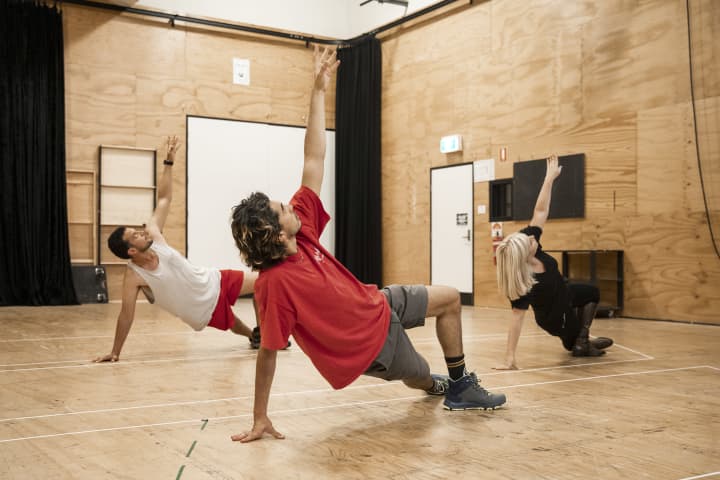Back in 2015, the creative trio of Carolyn Burns, Tim Finn and Simon Phillips collaborated on the beloved musical Ladies in Black, an adaptation of Madeleine St John’s novel The Women in Black. They enjoyed the project so much, they’ve been looking for another to work on together ever since.
It was Finn who suggested the Kazuo Ishiguro story Come Rain or Come Shine, one of five short stories in the author’s collection Nocturnes. ‘[Finn is] a massive Kazuo Ishiguro fan,’ says Burns, ‘and Come Rain or Come Shine is a fabulous mix of hilarious comedy, with more than an undercurrent of heartbreak.’
The story centres on three best friends who met at university: Emily and Ray, who bond over their mutual love of jazz and the great American songbook; and Charlie, ‘who doesn’t like that sort of music at all’, as Burns describes it. The action takes place 27 years later, when Ray is delighted to receive an invitation to visit his two oldest friends, unaware that they have a hidden agenda. ‘Tim, Simon and I decided to have a go at turning it into a musical partly because we like a challenge, but mainly because we loved the characters,’ Burns says, ‘and there are so many magical moments in the story’.
Phillips concurs: ‘Tim sent us this story and first we cried laughing, then we shed a little tear for human dignity at the end,’ he says. ‘In some ways it’s not an obvious choice for a musical – it’s a study in human insecurity pushed to farcical extremes and there’s no material for big emotional ballads in it – but we thought “what the hell, we love it, let’s give it a bash!”’
Finn himself was attracted to the story’s ‘gentle subversion’, which he calls both hilarious and profound. ‘It’s rare that a story will make you laugh out loud and shed a tear. I felt a stirring within me,’ he says. ‘I don’t know how else to describe it.’
‘The story is about music itself – how it underscores the best and worst moments in our lives.’ – Tim Finn
‘For me,’ adds Finn, the story is ‘about the depths and shallows of abiding friendship, and music itself – how it underscores the best and worst moments in our lives.’

Simon Phillips and Carolyn Burns in the MTC rehearsal rooms in January 2021. Photo: Charlie Kinross
MUSIC & MYSTERIES
As with Ladies in Black, Finn has been tasked with writing the score for Come Rain or Come Shine, while Burns and Phillips collaborate on the script. ‘I go racing off ahead and write a slew of songs,’ says Finn, ‘then Simon and Caro begin writing the script. Their ways are still unknown to me, but they have taught me everything I know about music theatre and I consider myself very fortunate to have been under their tutelage.’
Explaining ‘their ways’ Phillips agrees that ‘Tim’s very alert to the moments in the story that just yell SONG to him, and we’ve learned to trust that. But this time we took his list of initial impulses and created a kind of structural blueprint, so we were all on the same page.’ He adds that Ishiguro writes a lot of dialogue, which they ‘were able to filch where necessary’ but it also ‘means that some of the songs are necessarily quite wordy, because they’re covering significant plot and text, as opposed to a simple thought bubble or emotional crie de coeur.’ From there, they would work out ‘how to account for the sections of story that Ishiguro breezes over, but which in the theatrical context needed fleshing out.’ After mapping out the scenarios and context, Burns then creates new dialogue accordingly.
Come Rain or Come Shine is the latest MTC NEXT STAGE commission, which will see the work developed through a series of workshops and ongoing support. ‘It means everything to makers of theatre to have the chance to hear and watch their work come alive, on the floor, with skilled and committed professional actors,’ says Finn.
‘It’s a wonderful gesture of confidence, which is an enormous boost to the creative process,’ adds Phillips. ‘In our case, we’re established theatre professionals, so we should feel pretty sure of ourselves, but we were STILL thrilled to bits when [MTC] responded so positively to the idea – especially during Covid, when we had no other source of income! It allowed us to press ahead with a spring in our fingers. So imagine what it means to a younger or less experienced writer, being given the support and encouragement that NEXT STAGE allows, and the opportunity to test their work and bounce ideas around during the writing process.’
NEXT STAGE is made possible with the support of our Playwrights Giving Circle Donors, The Ian Potter Foundation, Naomi Milgrom Foundation, The Myer Foundation, Malcolm Robertson Foundation and The University of Melbourne.
Published on 29 April 2021





